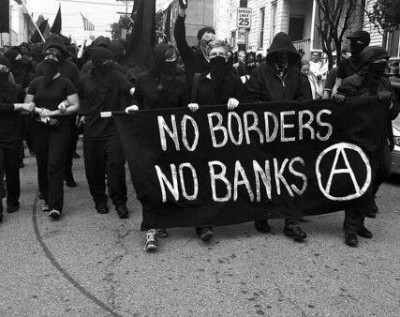On Friday, when the judge at Boulogne-sur-mer announced, three times that the trial of 8 friends was irregular the court room erupted into applause and cheering. Waiting outside were a brace of Police de l’Air et des Frontières (PAF) waiting to take 5 of them (the foreigners) to detention after they had been served with Obligation de Quitter la Territoire Français (OQTF). But these had already escaped and were not present to appreciate the announcement of their victory.
The judges had decided that there were too many irregularities and that the authorities had not followed procedure when arresting and detaining the 8 people on the roof of an abandoned building in the centre of Calais on Sunday the 27th April.
This decision marks a political victory for our movement at a time when authorities using the state of emergency arogantly permit themselves to use all means of violence and coersion to impose their rascist politics on people in Calais and the Jungle.
In defiance of the `zero-tolerance of squats` in this city, imposed by the mayor, Natasha Bouchart, the prefecture and co, The Collective ‘Salut o Toi’ opened a building on the weekend of 26-27April. Banners hung on the facade of the building read ‘Une toit pour tous.’ and ‘Amitié entre les Peuples‘ while supporters of the action on the outside handed out pamphlets to the passers by while others filmed the police.
This action was meant to provoke a reaction from the `authorities`, according to Phillipe Mignonet ‘Natascha Bouchart had contacted Bernard Cazeneuve’ the minister of the interior after which the order to evacuate the squat was given, without any respect of any legal procedure. CRS, lots of them, made a cordon around the building whilst other police types armed with a battering ram tried to batter down the door. After failing to budge the bomb proof barricades they smashed a window at street level to enter the building and gain access to the roof where 8 people had gathered and were subsequently violently arrested.
They were put on garde à vue (GAV) which was extended to 48hours after political pressure from ‘high up’ to have a comparution immédiate (fast trial) when the prosecuter initially had indicated that there was no need to extend the GAV nor to have a comparution immediate. This put into question the independance of the judicial authority, indeed”the prosecutors department doesn’t comply the exigence of independance towards the executive power” as frequently repeated by the European Court of Human Rights.
During the initial 24hours of GAV the people were not informed of their rights ; to an interpreter, to see a lawyer, to see a doctor or to contact someone they are close to, neither had they been explicitly asked to give their photos, fingerprints and DNA.
Initially the activists were charged with violation de domicile (violating a domicile) which was soon dropped when it was realised that the building was abandoned, and dégradation en réunion (degradation in a group) but soon these charges were changed to degradation en reunion and refusal to submit to giving their DNA, fingerprints and photos.
At the end of the GAV the people were taken to see the Judge of Liberty and Detention (JLD) to see if they were to be freed or not, by this time the friends, by the counsel of their lawyers, had given their identities. Five foreigners and three French nationals went before the JLD, but only the French were released the other five were taken to detention to garantee their presence at the trial which was to be held the next day, Wednesday 30 March.
Wednesday saw the next installment of this masquerade of justice when three from the five people who had been detained in prison could not be transported from prison to court because of a lack of staff and organisation.
Instead, after a long wait, an audience was organised in a small room with five present and in person to stand trial while a video conference link to the prison where the other three were, was set up. From the begining the lawyers for our team manifested their shock at the massive presence of police, some with automatic weapons in the small room. The three who were not present stated that they wanted to stand trial that day and to be present in person in front of the court and it was the incompetence of the state that they could not be. This resulted in the demand for their immediate release from prison and the trial being postponed until Friday 1 April. The judge, dismayed by the absurdity of the situation, granted their release after the lawyers heavily insisted for a reconsideration of their detention. By the end of the night everyone was free.
Friday 1 April, the court aknowledged the many irregularities in the way the police had conducted themselves during the arrest and the GAV.
To put this victory into context, the month of March has seen the destruction of the south part of the Jungle, the homes of over two thousand people : children, women, men and families were smashed to the ground and thrown away into skips by workers and diggers protected by hundreds of CRS for three weeks until all that is left is a wasteland. This has been an act of terrorism, by a state that decries terrorism in the media, whereas the voiceless have to sew their mouthes together and starve themselves in order to be heard, as nine people did for 24 days, 2 March – 26 March.
This action is a way to shine a light on the systematic destruction of homes and the segregation that exists in Calais to denounce the injustices of this racist, fascist political system.
[From Calais Migrant Solidarity, April 3rd]

